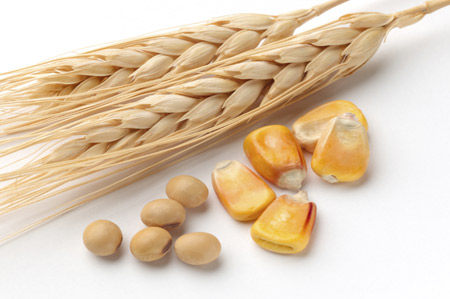 (Reuters) – U.S. soybeans jumped 1 percent on Monday, rising for three out of the past four sessions, on expectations of strong demand following a steep decline in prices, while corn gained for a second consecutive session.
(Reuters) – U.S. soybeans jumped 1 percent on Monday, rising for three out of the past four sessions, on expectations of strong demand following a steep decline in prices, while corn gained for a second consecutive session.
Wheat edged higher, building on Friday’s 1.7 percent rally although gains were capped by prospects of ample global supplies.
Chicago Board Of Trade November soybeans rose 1 percent to $10.93-3/4 a bushel by 0207 GMT and December corn added 0.9 percent to $3.75 a bushel. September wheat gained 0.4 percent to $5.40 a bushel.
“The main driver for soybeans is demand from China as it has been very actively taking U.S. beans,” said one Singapore-based trader.
U.S. soybean prices are being supported by expectations of strong demand after new-crop November prices fell to a contract low of $10.55 a bushel last week.
On Thursday, the U.S. Department of Agriculture reported soybean export sales in the latest week at more than 2.5 million tonnes, including 2.45 million for the 2014/15 marketing year – topping trade expectations.
The front-month August soy contract is being underpinned by tight supplies of old-crop U.S. soybeans and relatively firm cash markets ahead of the contract’s delivery period, which starts this week.
Corn prices are also finding support after sliding to a four-year low last week on prospects for a bumper harvest. Growing weather has been optimal during the corn crop’s crucial pollination phase this month.
A Reuters survey of 20 analysts pegged the U.S. corn yield at 170.5 bushels per acre, above the USDA’s forecast of 165.3 and the previous record yield of 164.7 from 2009.
The USDA put weekly sales of the grain at 1.14 million tonnes for 2014/15, above market estimates.
“Given the extent of the sell-off in the last month, we view grain prices as likely to stabilise near-term or at least until the release of the next USDA monthly supply and demand report on 12 August,” Paul Deane, senior agricultural economist at ANZ Bank said in a research note.




